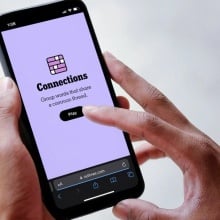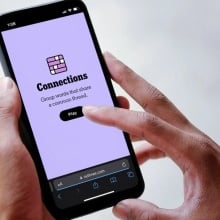Toxic masculinity is a term with a toxic legacy.
As with many words typically associated with feminist discourse, 'toxic masculinity' is a phrase that's been co-opted by the so-called alt-right.
That's one of the reasons journalist Liz Plank almost removed every single use of the term from her book For the Love of Men: A New Vision for Mindful Masculinity about a week prior to publication — much to the displeasure of her editor.
"I had this thought about that it was going to turn off the very people that I that we desperately need to be tuned into this conversation," Plank told me over the phone.
Plank — who holds a Masters in global gender politics from the London School of Economics — has spent the past four years researching modern masculinity and writing a guide to combatting its toxic form through actionable steps.
Toxic masculinity is a term that, as the New York Times deftly put it, was "an expression once relegated to women’s studies classrooms that suddenly seems to be everywhere." 2019 saw the explosion of this term into the mainstream lexicon after a Gillette razor blade advert questioned what men "can be" and posited the idea that they should refrain from catcalling women and bullying other men. Days prior to the ad's release, the American Psychological Association (ASA) released its first ever guidelines for therapists working with boys and men feeling pressured to conform to traditional ideas about what it means to be a man.
"When half the population gets trained to block emotions, they lose the ability for empathy."
Researchers define toxic masculinity — AKA "traditional masculinity ideology" — as a set of beliefs and behaviours including hiding your emotions or distress, using violence or "tough-guy" behaviour as a way of showing power, and exhibiting an appearance of "hardness".
The combined effect of these constructs and actions is harmful not only to the men who've subsumed them, but also to the women in their lives. One line from Plank's book summed up the destructive impact toxic masculinity is wielding on society: "When half the population gets trained to block emotions, they lose the ability for empathy."
"Every man can remember the first time that they were called a pussy, right?" Plank told me. "Or called the F-word, or when they were told that they were not being a 'real man,' and that they needed to hide their weakness, that they needed to hide this empathy, that they needed to be strong and stoic."
So, how do we go about having productive conversations with the men in our lives about toxic masculinity? Here are Liz Plank's tip for broaching the topic with men you know and love.

Avoid the term 'toxic masculinity'
"First of all, I think that the term toxic masculinity is not the most useful term to bring up especially with someone who is a gender theory virgin," said Plank. "These are words that are being used as weapons by like, Tucker Carlson and Jordan Peterson to signify this idea that people who use these words want to come after your way of life, they want to criticise the way that you were raised by your father that you love and the way that you raised your sons," she added. "That's threatening and difficult to come to terms with."
Since entering the lexicon, toxic masculinity has become a loaded expression — one you can now find in subreddits like r/MGTOW (which stands for Men Going Their Own Way) and r/MensRights. Canadian psychologist Jordan Peterson — who's gained a following among the far-right community — appears to reject the concept of toxic masculinity, stating there's a "backlash" and "a sense there is something toxic about masculinity."
Talking to men about the ways rigid gender roles could be affecting their mental health and the way they behave towards women feels more urgent than ever before. It was during a conversation with David Hogg — who survived the Stoneman Douglas High School shooting on Feb. 14, 2018 — that she realised the importance of language in conversations aimed at challenging people's ideas.
"When I asked David Hogg, 'Is gun violence related to toxic masculinity?' he said he spent his whole life trying to talk about gun safety to people who feel very threatened by conversations about gun safety," said Plank. "So, he thinks he thinks a lot about language and challenged me in his answer to think about the language that I was using."
Steer clear of gender theory jargon
So, how do you broach a conversation about toxic masculinity with older men, including our dads? "Someone who has no idea that gender has even impacted their lives is going to feel very uncomfortable about any acknowledgement that this has shaped their decision-making and their behaviors, attitudes, and who they are in the world," said Plank, who advised not using the term "toxic masculinity" in those conversations.
"Even the word gender, the word patriarchy, words that if you have read books and have a lot of knowledge about this, these are words that are familiar to you," she added.
Cutting down on gender theory terminology and asking simple questions will result in more productive conversations, argued Plank. She added that the most "productive and interesting conversations with men" she's had have occurred when she's asked them really simple questions about their lives. "I often don't mention the word masculinity at all," she said.
Start with self-reflection
"One of the most impactful questions I asked men for this book was, 'What is hard about being a man?'" Plank said. "This is a question that I've not had a single man not stare at me for a full 10 seconds before even starting to begin to think about answering that question. Because it's a question they're not really asked and they've never really given permission to ask themselves."
"Instead of coming in with, 'You have all these behaviors that are hurting all the people that you love around you, and you need to take responsibility for it.' Yes, they need to do that. But that's like the second step. The first step is self reflecting," Plank added. "That's where empathy is really important."
I asked Plank what response was the most common when she put this question to men she interviewed. "What came up a lot is that the hardest thing about being a man wasn't necessarily women — it was other men," said Plank. "That's not to say women don't reinforce these patriarchal notions of masculinity and have absorbed them as well." Most of the men Plank spoke to had never talked about these problems with other men in their lives.
The "golden ticket," as Plank described it, from those conversations was, in fact, the sheer diversity of the answers the men gave. "There are a million answers to that question because there's not one way of being a man in the world. There's so many identities, perspectives, and life stories with which masculinity intersects," she said.
"Being a man could mean a million different things to a million different people." Realising that there's no one way to "be a man" is an idea we, as a society, could do well to remember.
Topics Gender Social Good



























